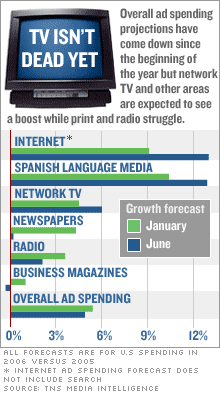|
Ad rates: TV's hot summer drama
Fox says most ads spots for next season are already sold. But CBS and ABC claim advertisers are still being cautious.
NEW YORK (CNNMoney.com) - Sluggish. Challenging. Difficult. Network and advertising executives have used words like those to describe the so-called upfront negotiations to hammer out ad deals for next fall's TV season.
The major broadcasters unveiled their fall programming last month. In years past, advertisers and the networks have quickly done a lot of their upfront business shortly after these presentations. But this year, many advertisers were more circumspect. One big reason behind the delayed start to the wheeling and dealing was that ABC apparently had been pressuring advertisers to pay rates based on the new Nielsen "live plus seven" ratings, which measure how many people watched a show when it originally aired or within seven days of its air date using a digital video recorder (DVR) like TiVo (Charts). Marketers balked, though, arguing that most people who watch a program on a DVR are fast forwarding through commercials. And last week, ABC reluctantly agreed to not press the issue after it became clear that other networks were not willing to join the "live plus seven" crusade. Still, after a slow start, it appears there are some encouraging signs for the broadcasters. TNS Media Intelligence, an advertising research firm, is now predicting a slightly better year for network TV than it originally forecast in January. In a report this week, the firm said network TV ad spending should grow 6 percent from a year ago, compared to the firm's earlier forecast of 4.5 percent growth. Networks claiming victories...
And News Corp.-owned Fox is claiming that all the talk about a weak upfront period was overblown. At a media conference Tuesday, News Corp (Charts). president Peter Chernin expressed bemusement about the conventional wisdom that this year's upfront was off to a slow start. "For some reason, this upfront has been remarkably played out in the press," he said. "The amount of speculation is more than I've ever seen and more misguided than I've ever seen." Chernin said Tuesday that 70 percent of Fox's upfront inventory was already sold and that the network expected to generate a 2 percent to 3 percent increase in ad rates from last year. Granted, if you have lots of hit shows that appeal to the 18 to 49 year olds that advertisers love then it's easier to do business. Fox won the 18-49 ratings race this year thanks to its immensely popular "American Idol," as well as hits like "House" and "24." Still, Fox's bold proclamation seemed to catch other media executives, as well as some media buyers, by surprise. Speaking at the same conference, Thomas Staggs, CFO of Walt Disney (Charts), which owns ABC, and CBS (Charts) chief executive Leslie Moonves both said advertisers were being coy regarding how much they wanted to spend. Staggs said he "felt comfortable" that pricing would be in line with ABC's expectations but declined to say what those expectations were. Moonves, however, said he thought that rates could be up in the "low single digits" for CBS and ABC. ...but advertisers still wary
But one media buyer said that forecast may be optimistic. Jordan Breslow, director of research for MediaCom, a media buying firm owned by WPP Group (Charts), said he thought CBS and ABC might show no growth in upfront ad sales. He added that NBC is likely to report another decrease in ad revenue. NBC, which finished in fourth place with 18-49 year olds for the second straight year despite airing the Winter Olympics in February, took in about $1.9 billion in upfront ad sales last year, down from $2.9 billion in ads for the 2004-2005 season. Officials from NBC were not immediately available for comment about how their upfront ad sales were progressing. Another media buyer noted that advertisers may be willing to spend less on traditional network TV this year simply because of all the other choices they have. All the broadcasters touted their digital offerings, including Internet and mobile versions of TV shows. "Advertisers are being more deliberate now because they are looking at new media options. Business will be done but not at a hectic pace," said Lyle Schwartz, an analyst with Mediaedge:cia, another media buying firm. "People don't have to rush and get their business done right away. They want to spend time and decipher market dynamics." MediaCom's Breslow said recent signs that economy is slowing are taking a toll as well. And with the Federal Reserve apparently set to raise interest rates at the end of this month and perhaps again in August, there are growing concerns about what may happen to consumer spending as the year progresses. "The economy is another thing. Advertisers are a little wary and are holding back money," he said. Nonetheless, CBS' Moonves said he was not worried about the tepid start to the ad buying season. He even downplayed the importance of the upfront ad buying period, saying the network doesn't expect major problems selling out its ad inventory over time through the so-called "scatter" market. Advertisers typically pay different rates for "scatter" ads than they do during the upfront period. "If you believe in your schedule, upfront volume doesn't matter that much. Scatter works out well," he said. Disney's Staggs said ABC also expected to sell more through the scatter market this year. But Moonves added there's still healthy demand during the upfront market for ad slots on shows with truly large followings. To that end, Moonves said CBS has already sold more than 20 spots for Super Bowl XLI, which CBS will air in February 2007. _____________________ Related: Big media: Adapt or die
Related: CBS: Cheap Broadcasting Stock |
|



